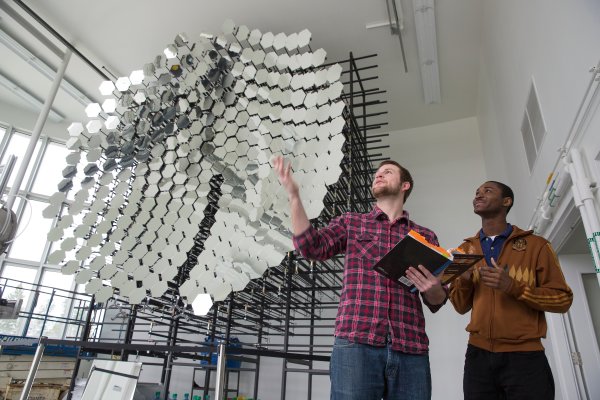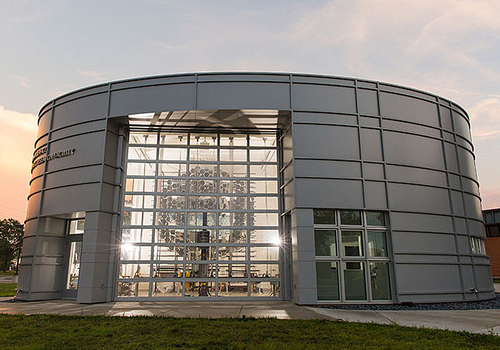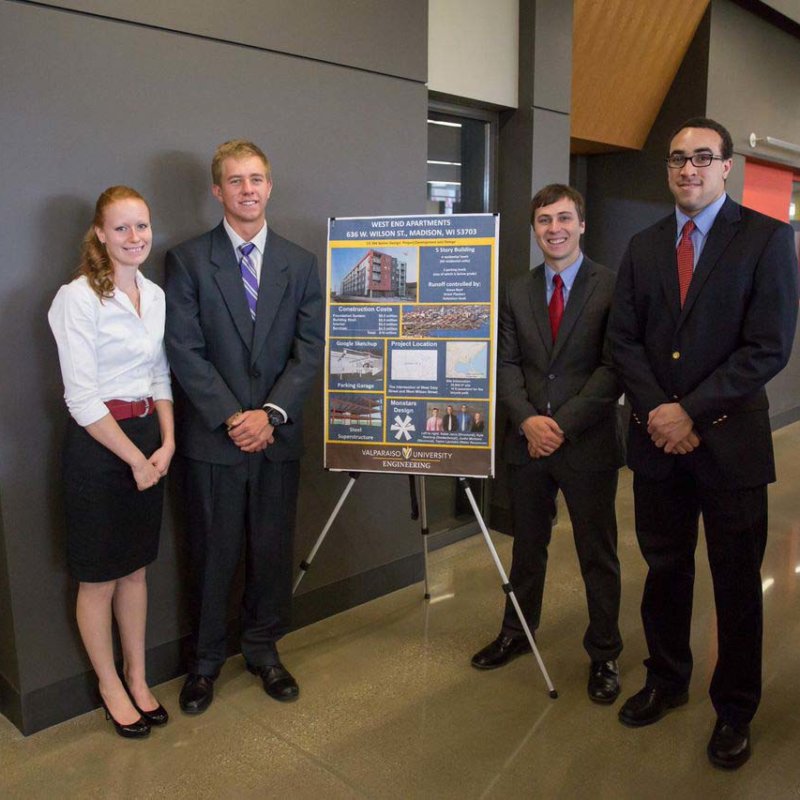Bioengineering
At the College of Engineering at Valpo, bioengineering students learn about improving the lives of others by combining principles of engineering and physiological knowledge.
The Bioengineering Program provides a series of professional studies grounded in engineering fundamentals and arts and sciences and augmented by the development of interpersonal skills, experiential learning, and an appreciation of lifelong learning. Graduates are prepared to apply their knowledge to society’s needs and help shape the future.
About Our Bioengineering Degrees
Students in our bioengineering school benefit from the many advantages our College of Engineering has to offer, including:
- Exclusive undergraduate program featuring small class sizes
- Interdisciplinary design projects and small laboratory groups that foster teamwork
- Extensive computational and laboratory facilities
- Opportunities for participation in funded undergraduate research programs including summer research
- Co-operative Education program with employment opportunities throughout the U.S.
Career placement rates for College of Engineering graduates average 97% over last 10 years.
The three different tracks in the bioengineering major will prepare graduates for a variety of careers, including:
- Project Engineer
- Process Engineer
- Design Engineer
- Manufacturing Engineer
- Research and Development
- Professor/Teacher
- Marketing
- Patent Lawyer
Our graduates can expect to work in places like:
- Biotech Companies
- Pharmaceutical Companies
- Research Laboratories
| Major Requirements: Minimum 126 Credits | ||
|---|---|---|
| BIO 151 | Human Anatomy and Physiology I | 4 Cr. |
| BIO 152 | Human Anatomy and Physiology II | 4 Cr. |
| MATH 132 | Calculus II | 4 Cr. |
| MATH 253 | Calculus III | 4 Cr. |
| MATH 260 | Linear Systems and Matrices | 1 Cr. |
| MATH 270 | Ordinary Differential Equations | 3 Cr. |
| PHYS 141 | Newtonian Mechanics | 3 Cr. |
| PHYS 141L | Experimental Physics I | 1 Cr. |
| PHYS 142 | Electricity, Magnetism, & Waves | 3 Cr. |
| STAT 240 | Statistical Analysis | 3 Cr. |
| REL 100 | Religion and Society | 3 Cr. |
| World Language/Diversity Elective | 3 Cr. w | |
| Humanities, Social Science, Religious Studies Electives | 6 Cr. w | |
| VUE 101 | Valparaiso University Experience: Exploring Values | 4 Cr. |
| VUE 102 | Valparaiso University Experience: Finding Your Voice | 4 Cr. |
| XS 101 | Wellness and Stress | 1 Cr. |
| GE 100 | Fundamentals of Engineering | 2 Cr. |
| GE 109 | Mechanics-Statics | 3 Cr. |
| GE 311 | Financial Decisions in Engineering | 1.5 Cr. |
| GE 312 | Ethical Decisions in Engineering | 1.5 Cr. |
| GE 497 | Senior Design Project I | 3 Cr. |
| GE 498 | Senior Design Project II | 3 Cr. |
| ECE 281 | Fundamentals of Electrical Engineering | 2.5 Cr. |
| ME 102 | Computer Aided Design | 1 Cr. |
| ME 125 | Computer Prog/Mech Engineers & Bioengin | 1 Cr. |
| ME 201 | WIC:Tech Writ-Mech Engrs/Bioe | 1 Cr. |
| ME 209 | Mechanics-Dynamics | 3 Cr. |
| ME 252 | Materials Science | 2.5 Cr. |
| ME 261 | Analog Circuits Laboratory | 0.5 Cr. |
| ME 333 | Mechanical Measurements Laboratory | 4 Cr. |
| ME 352 | Materials Science & Mechanics Laboratory | 0.5 Cr. |
| ME 355 | System Modeling and Numerical Methods | 3 Cr. |
| BE 210 | The Bioengineering Design Process | 1 Cr. |
| BE 317 | Sustainable Engineering | 2 Cr. |
| BE 320 | Bioengineering Technologies Lab | 1 Cr. |
| BE 340 | Bioelectricity | 3 Cr. |
| BE 369 | Biomechanics | 3 Cr. |
| BE 415 | Biomaterials | 3 Cr. |
| Bioengineering Electives | 6 Cr. | |
| One course from the following options: | ||
| MATH 126 | Calculus and Functions Part II | 4 Cr. |
| MATH 131 | Calculus I | 4 Cr. |
| Total Bioengineering Core Credits: 107 | ||
| Biomechanical Track: | ||
| CHEM 115 | Essentials of Chemistry | 4 Cr. |
| ME 215 | Mechanics of Materials | 3 Cr. |
| ME 270 | Thermodynamics I | 3 Cr. |
| ME 373 | Fluid Mechanics | 3 Cr. |
| ME 376 | Heat Transfer | 3 Cr. |
| ME 442 | Automatic Control | 3 Cr. |
Note:
Writing Intensive Course (as indicated by a superscript “w”): At least course taken to satisfy the World Languages/Diversity Elective, Humanities, Social Science, and Religious Studies Electives, REL 100, or ME 201 must be a Writing Intensive Course. A list of courses approved as a Writing Intensive Course is provided on General Education Requirements.
Writing in the Discipline (as indicated by a superscript “d”): At least one course must be a Writing in the Discipline course.
Capstone Writing Assignment: The Capstone Writing Assignment (CWA) requirement may be fulfilled by completing a department-designated assignment, often assigned in capstone courses. Senior standing recommended.
Cooperative Education: Courses GE 481-GE 483 are graded S/U only.
World Language/Diversity Elective: Students will take three credits from either world languages at the 102 level or above or from the diversity list beginning on General Education Requirements.
Humanities, Social Science, Religious Studies Electives: Students will take six credits from the approved list of Humanities courses, Social Sciences courses, or Religious Studies courses. Courses may be from the same area or from different areas. See General Education Requirements for Humanities and Social Sciences courses.
MCAT Preparation: Students participating in the Biomedical Track that wish to take the Medical College Admission Test (MCAT) should take SOC 110 – Introduction to Sociology (3 credits that count towards Humanities, Social Science, Religious Studies Electives) and PSY 110 – General Psychology (3 credits).
Bioengineering Electives: Additional bioengineering and mechanical engineering courses are to be selected to provide areas of individual study emphasis from the following courses: BE 200, BE 468, ME 253, ME 353, ME 361, ME 362, ME 364, ME 365, ME 366, ME 367, ME 368, ME 369, ME 374, ME 405, ME 452, ME 453, ME 455, ME 456, ME 457, ME 467, and multiple sections of BE 490 or ME 490. Other courses may be used to satisfy this elective with the approval of the department faculty. Only three hours of BE 499 or ME 499 course credits may be applied as an BE elective. Courses which fulfill bioengineering elective requirements are indicated with a superscript “b.”
| Major Requirements: Minimum 126 Credits | ||
|---|---|---|
| BIO 151 | Human Anatomy and Physiology I | 4 Cr. |
| BIO 152 | Human Anatomy and Physiology II | 4 Cr. |
| MATH 132 | Calculus II | 4 Cr. |
| MATH 253 | Calculus III | 4 Cr. |
| MATH 260 | Linear Systems and Matrices | 1 Cr. |
| MATH 270 | Ordinary Differential Equations | 3 Cr. |
| PHYS 141 | Newtonian Mechanics | 3 Cr. |
| PHYS 141L | Experimental Physics I | 1 Cr. |
| PHYS 142 | Electricity, Magnetism, & Waves | 3 Cr. |
| STAT 240 | Statistical Analysis | 3 Cr. |
| REL 100 | Religion and Society | 3 Cr. |
| World Language/Diversity Elective | 3 Cr. w | |
| Humanities, Social Science, Religious Studies Electives | 6 Cr. w | |
| VUE 101 | Valparaiso University Experience: Exploring Values | 4 Cr. |
| VUE 102 | Valparaiso University Experience: Finding Your Voice | 4 Cr. |
| XS 101 | Wellness and Stress | 1 Cr. |
| GE 100 | Fundamentals of Engineering | 2 Cr. |
| GE 109 | Mechanics-Statics | 3 Cr. |
| GE 311 | Financial Decisions in Engineering | 1.5 Cr. |
| GE 312 | Ethical Decisions in Engineering | 1.5 Cr. |
| GE 497 | Senior Design Project I | 3 Cr. |
| GE 498 | Senior Design Project II | 3 Cr. |
| ECE 281 | Fundamentals of Electrical Engineering | 2.5 Cr. |
| ME 102 | Computer Aided Design | 1 Cr. |
| ME 125 | Computer Prog/Mech Engineers & Bioengin | 1 Cr. |
| ME 201 | WIC:Tech Writ-Mech Engrs/Bioe | 1 Cr. |
| ME 209 | Mechanics-Dynamics | 3 Cr. |
| ME 252 | Materials Science | 2.5 Cr. |
| ME 261 | Analog Circuits Laboratory | 0.5 Cr. |
| ME 333 | Mechanical Measurements Laboratory | 4 Cr. |
| ME 352 | Materials Science & Mechanics Laboratory | 0.5 Cr. |
| ME 355 | System Modeling and Numerical Methods | 3 Cr. |
| BE 210 | The Bioengineering Design Process | 1 Cr. |
| BE 317 | Sustainable Engineering | 2 Cr. |
| BE 320 | Bioengineering Technologies Lab | 1 Cr. |
| BE 340 | Bioelectricity | 3 Cr. |
| BE 369 | Biomechanics | 3 Cr. |
| BE 415 | Biomaterials | 3 Cr. |
| Bioengineering Electives | 6 Cr. | |
| One course from the following options: | ||
| MATH 126 | Calculus and Functions Part II | 4 Cr. |
| MATH 131 | Calculus I | 4 Cr. |
| Total Bioengineering Core Credits: 107 Cr. | ||
| Bioelectrical Track: | ||
| CHEM 115 | Essentials of Chemistry | 4 Cr. |
| ECE 221 | Digital Logic Design | 3 Cr. |
| ECE 251 | Engineering Programming I | 3 Cr. |
| ECE 322 | Embedded Microcontrollers | 3 Cr. |
| ECE 360 | Signals and Systems | 3 Cr. |
| ECE 452 | Digital Signal Processing | 3 Cr. |
Note:
Writing Intensive Course (as indicated by a superscript “w”): At least course taken to satisfy the World Languages/Diversity Elective, Humanities, Social Science, and Religious Studies Electives, REL 100, or ME 201 must be a Writing Intensive Course. A list of courses approved as a Writing Intensive Course is provided on General Education Requirements.
Writing in the Discipline (as indicated by a superscript “d”): At least one course must be a Writing in the Discipline course.
Capstone Writing Assignment: The Capstone Writing Assignment (CWA) requirement may be fulfilled by completing a department-designated assignment, often assigned in capstone courses. Senior standing recommended.
Cooperative Education: Courses GE 481-GE 483 are graded S/U only.
World Language/Diversity Elective: Students will take three credits from either world languages at the 102 level or above or from the diversity list beginning on General Education Requirements.
Humanities, Social Science, Religious Studies Electives: Students will take six credits from the approved list of Humanities courses, Social Sciences courses, or Religious Studies courses. Courses may be from the same area or from different areas. See General Education Requirements for Humanities and Social Sciences courses.
MCAT Preparation: Students participating in the Biomedical Track that wish to take the Medical College Admission Test (MCAT) should take SOC 110 – Introduction to Sociology (3 credits that count towards Humanities, Social Science, Religious Studies Electives) and PSY 110 – General Psychology (3 credits).
Bioengineering Electives: Additional bioengineering and mechanical engineering courses are to be selected to provide areas of individual study emphasis from the following courses: BE 200, BE 468, ME 253, ME 353, ME 361, ME 362, ME 364, ME 365, ME 366, ME 367, ME 368, ME 369, ME 374, ME 405, ME 452, ME 453, ME 455, ME 456, ME 457, ME 467, and multiple sections of BE 490 or ME 490. Other courses may be used to satisfy this elective with the approval of the department faculty. Only three hours of BE 499 or ME 499 course credits may be applied as an BE elective. Courses which fulfill bioengineering elective requirements are indicated with a superscript “b.”
| Major Requirements: Minimum 126 Credits | ||
|---|---|---|
| BIO 151 | Human Anatomy and Physiology I | 4 Cr. |
| BIO 152 | Human Anatomy and Physiology II | 4 Cr. |
| MATH 132 | Calculus II | 4 Cr. |
| MATH 253 | Calculus III | 4 Cr. |
| MATH 260 | Linear Systems and Matrices | 1 Cr. |
| MATH 270 | Ordinary Differential Equations | 3 Cr. |
| PHYS 141 | Newtonian Mechanics | 3 Cr. |
| PHYS 141L | Experimental Physics I | 1 Cr. |
| PHYS 142 | Electricity, Magnetism, & Waves | 3 Cr. |
| STAT 240 | Statistical Analysis | 3 Cr. |
| REL 100 | Religion and Society | 3 Cr. |
| World Language/Diversity Elective | 3 Cr. w | |
| Humanities, Social Science, Religious Studies Electives | 6 Cr. w | |
| VUE 101 | Valparaiso University Experience: Exploring Values | 4 Cr. |
| VUE 102 | Valparaiso University Experience: Finding Your Voice | 4 Cr. |
| XS 101 | Wellness and Stress | 1 Cr. |
| GE 100 | Fundamentals of Engineering | 2 Cr. |
| GE 109 | Mechanics-Statics | 3 Cr. |
| GE 311 | Financial Decisions in Engineering | 1.5 Cr. |
| GE 312 | Ethical Decisions in Engineering | 1.5 Cr. |
| GE 497 | Senior Design Project I | 3 Cr. |
| GE 498 | Senior Design Project II | 3 Cr. |
| ECE 281 | Fundamentals of Electrical Engineering | 2.5 Cr. |
| ME 102 | Computer Aided Design | 1 Cr. |
| ME 125 | Computer Prog/Mech Engineers & Bioengin | 1 Cr. |
| ME 201 | WIC: Tech Writ-Mech Engrs/Bioe | 1 Cr. |
| ME 209 | Mechanics-Dynamics | 3 Cr. |
| ME 252 | Materials Science | 2.5 Cr. |
| ME 261 | Analog Circuits Laboratory | 0.5 Cr. |
| ME 333 | Mechanical Measurements Laboratory | 4 Cr. |
| ME 352 | Materials Science & Mechanics Laboratory | 0.5 Cr. |
| ME 355 | System Modeling and Numerical Methods | 3 Cr. |
| BE 210 | The Bioengineering Design Process | 1 Cr. |
| BE 317 | Sustainable Engineering | 2 Cr. |
| BE 320 | Bioengineering Technologies Lab | 1 Cr. |
| BE 340 | Bioelectricity | 3 Cr. |
| BE 369 | Biomechanics | 3 Cr. |
| BE 415 | Biomaterials | 3 Cr. |
| Bioengineering Electives | 6 Cr. | |
| One course from the following options: | ||
| MATH 126 | Calculus and Functions Part II | 4 Cr. |
| MATH 131 | Calculus I | 4 Cr. |
| Total Bioengineering Core Credits: 107 Cr. | ||
| Biomedical Track: | ||
| CHEM 121 | General Chemistry I | 4 Cr. |
| CHEM 122 | General Chemistry II | 4 Cr. |
| CHEM 221 | Organic Chemistry I | 4 Cr. |
| CHEM 222 | Organic Chemistry II | 4 Cr. |
| ME 270 | Thermodynamics I | 3 Cr. |
Note:
Writing Intensive Course (as indicated by a superscript “w”): At least course taken to satisfy the World Languages/Diversity Elective, Humanities, Social Science, and Religious Studies Electives, REL 100, or ME 201 must be a Writing Intensive Course. A list of courses approved as a Writing Intensive Course is provided on General Education Requirements.
Writing in the Discipline (as indicated by a superscript “d”): At least one course must be a Writing in the Discipline course.
Capstone Writing Assignment: The Capstone Writing Assignment (CWA) requirement may be fulfilled by completing a department-designated assignment, often assigned in capstone courses. Senior standing recommended.
Cooperative Education: Courses GE 481-GE 483 are graded S/U only.
World Language/Diversity Elective: Students will take three credits from either world languages at the 102 level or above or from the diversity list beginning on General Education Requirements.
Humanities, Social Science, Religious Studies Electives: Students will take six credits from the approved list of Humanities courses, Social Sciences courses, or Religious Studies courses. Courses may be from the same area or from different areas. See General Education Requirements for Humanities and Social Sciences courses.
MCAT Preparation: Students participating in the Biomedical Track that wish to take the Medical College Admission Test (MCAT) should take SOC 110 – Introduction to Sociology (3 credits that count towards Humanities, Social Science, Religious Studies Electives) and PSY 110 – General Psychology (3 credits).
Bioengineering Electives: Additional bioengineering and mechanical engineering courses are to be selected to provide areas of individual study emphasis from the following courses: BE 200, BE 468, ME 253, ME 353, ME 361, ME 362, ME 364, ME 365, ME 366, ME 367, ME 368, ME 369, ME 374, ME 405, ME 452, ME 453, ME 455, ME 456, ME 457, ME 467, and multiple sections of BE 490 or ME 490. Other courses may be used to satisfy this elective with the approval of the department faculty. Only three hours of BE 499 or ME 499 course credits may be applied as an BE elective. Courses which fulfill bioengineering elective requirements are indicated with a superscript “b.”
The Bioengineering program is accredited by the Engineering Accreditation Commission of ABET, www.abet.org
Mission
The Department of Mechanical Engineering and Bioengineering provides a program of professional study grounded in engineering fundamentals and arts and sciences augmented by the development of interpersonal skills, experiential learning, and an appreciation of life-long learning. Graduates are prepared to apply their knowledge to society’s needs and help shape the future.
BE Program Educational Objectives
Student Outcomes describe what students pursuing a bioengineering bachelor’s degree are expected to know and be able to do by the time of graduation. These relate to the skills, knowledge, and behaviors that students acquire as they progress through the program. The Student Outcomes help to direct and measure the success of the Bioengineering Program in accomplishing its mission. Review of the Student Outcomes is an integral part of the annual assessment process.
Program Educational Objectives are broad statements that describe what graduates are expected to attain within a few years of graduation. They are based on the needs of the program’s constituencies. The Program Educational Objectives help to direct and measure the success of the Bioengineering Program in accomplishing its mission. Review of the Educational Objectives is an integral part of the annual assessment process.
Within a few years of graduation, bioengineering graduates will be expected to:
- Have a vocation.
- Demonstrate growth or advancement in their chosen vocation.
- Serve society through their endeavors in their chosen vocation.
- Lead society in through their endeavors in their chosen vocation.
Student Outcomes
Upon successful completion of the Bioengineering Program, graduates will have:
- an ability to identify, formulate, and solve complex engineering problems by applying principles of engineering, science, and mathematics
- an ability to apply engineering design to produce solutions that meet specified needs with consideration of public health, safety, and welfare, as well as global, cultural, social, environmental, and economic factors
- an ability to communicate effectively with a range of audiences
- an ability to recognize ethical and professional responsibilities in engineering situations and make informed judgments, which must consider the impact of engineering solutions in global, economic, environmental, and societal context
- an ability to function effectively on a team whose members together provide leadership, create a collaborative and inclusive environment, establish goals, plan tasks, and meet objectives
- an ability to develop and conduct appropriate experimentation, analyze and interpret data, and use engineering judgment to draw conclusions
- An ability to acquire and apply new knowledge as needed, using appropriate learning strategies
- Additionally, the structure of the curriculum must provide both breadth and depth across the range of engineering and science topics consistent with the program educational objectives and student outcomes. The curriculum must prepare graduates with experience in:
(a) Applying principles of engineering, biology, human physiology, chemistry, calculus-based physics, mathematics (through differential equations) and statistics
(b) Solving bio/biomedical engineering problems, including those associated with the interaction between living and non-living systems
(c) Analyzing, modeling, designing, and realizing bio/biomedical engineering devices, systems, components, or processes
(d) Making measurements on and interpreting data from living systems
Enrollment and Graduation Data
The College of Engineering tracks its enrollment and graduation data, click the link below to view our data over the past five years.







